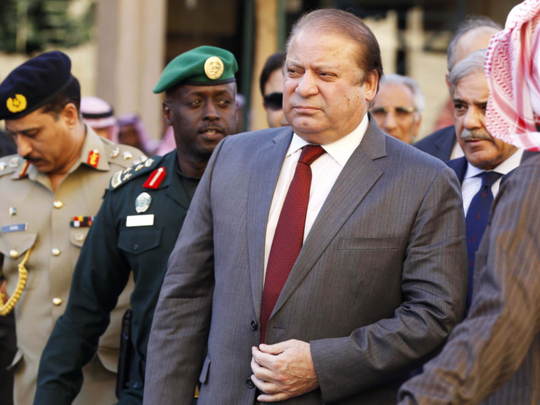
As millions of Pakistanis desperately searched for petrol across the south Asian country in the past week, Pakistan’s political landscape was becoming nothing comical yet again. The all too powerful accountant-turned-finance minister Ishaq Dar, a close confidante and relative of Prime Minister Nawaz Sharif, kicked off a telling salvo when he pronounced that the visibly acute shortages were caused by a conspiracy.
As if Dar’s claim wasn’t fit enough to become the butt of ongoing jokes, petroleum minister Shahid Khaqan Abbassi simply added to the confusion on Friday by holding Pakistan’s media responsible for causing a hype and provoking the worst petroleum shortage in the country’s history. Ironically, this latest crisis came at a time when the world is flush with cheap oil. Therefore, it must speak volumes over the failure of Sharif’s ruling structure to take charge of the Islamic world’s only country armed with nuclear weapons and oversee a period of increasing stability.
Welcome once again to another case of the multifaceted turmoil that engulfs Pakistan. Though ruling politicians eagerly washed their hands off any responsibility for the petrol crisis, their take was nothing short of an outright façade.
This latest crisis must also raise deeply troubling questions over the future of Pakistan’s democracy, more than six years after General Pervez Musharraf, the last military ruler, stepped down to pave the way for a return to civilian rule. While civilian politicians have arrived, their ability to tackle the multiple challenges faced by Pakistan and give the country a new direction remains in doubt.
To the extent that evidence is available, the latest crisis has yet again revealed Sharif’s determination to shield his ministers from responsibility. Though five officials down the line were suspended as the crisis unfolded, the regime is yet to accept political responsibility at a sufficiently high level. Given the magnitude of the crisis, its clear that the turmoil could have easily been avoided. Pakistan’s media, now in the regime’s firing line, reported months ago that the country’s main oil importing company was in serious financial turmoil. Eventually, the operations of the state-owned Pakistan State Oil (PSO), the oil importing company, came to a grinding halt when it failed to finance further oil imports. Consequently, Pakistanis have suffered acutely
Indeed, another energy crisis now appears to be staring Pakistan in the face, with recent reports of coming shortages of furnace oil, which are likely to further jeopardise Pakistan’s already strained ability to generate enough electricity. In an energy-starved country where some areas are already without electricity for 12 to 15 hours every day, a grim outlook for electricity supply is likely to just aggravate further.
Meanwhile, for Sharif, the petrol crisis should have been an eye opener. But clearly, it has only been just the contrary. The prime minister may be hoping for the turmoil to tide over as petrol supplies improve and Pakistanis return to business as usual. And yet, that may not necessarily prove to be the case. The failure to hold ministers accountable for their respective portfolios, raises some compelling questions over the country’s future. When Sharif took charge in a historic political transition in 2013, the event was widely celebrated as the coming of age of Pakistan’s democracy given that it was the first time ever that a democratically-elected government completed its tenure and handed power to another through the ballot box. And yet, subsequent events have cast doubts over the coming of age expectations.
Credentials undermined
Two areas have brutally undermined Sharif’s credentials. First, his failure to move decisively in carving out a new framework for national security has only come at the cost of more Pakistanis who were targeted in terrorist attacks. Rather than give a clear go ahead to escalate the fight against Taliban militants, Sharif chose to ignore his sceptics and preferred to seek a reconciliation with the militants.
Consequently, the element of surprise was lost as the prime minister, stricken by a visible sense of complacency, presided over meeting after meeting to discuss a half-baked peace process, which never took off. In the meantime, Taliban militants gained precious time to organise themselves against the Pakistan army. A fully-blown army campaign was finally launched in summer 2014 after a Taliban attack on Pakistan’s biggest international airport in Karachi, highlighted the rapidly building threat. In December 2014, a Taliban attack on a school in Peshawar resulted in about 150 lives being lost, most of them being schoolchildren. Equally important however, the attack clearly showed the fast-growing capacity of the Taliban to strike inside Pakistan’s urban areas, marking a substantial escalation in the country’s internal conflict.
At the same time, Sharif and his compatriots have clearly failed in managing Pakistan’s worsening economic challenge. The fuel shortages of the past week have only highlighted this gap. However, there are no visible signs of precious lessons having been learnt from this latest catastrophe. Behind another sorry week for Pakistan’s mass population, lies a longish tale of official complacency. In its 18 months since coming to power, Sharif’s government has pursued one mega project after another, centred mostly around Pakistan’s travel communication networks. Projects worth billions of rupees devoted to fancy bus, train and road links have driven such initiatives, though a large chunk of Pakistanis live in abject poverty.
Meanwhile, this period has coincided with clear signs of a collapse of Pakistan’s agricultural economy — a sector that serves as the lifeline for almost 60 per cent of the country’s population. Isn’t it time for Pakistanis across the grass roots to reach a logical conclusion — that Pakistan’s democratic journey is being squandered with a combination of growing insecurity and rising economic malaise.
Farhan Bokhari is a Pakistan-based commentator who writes on political and economic matters.









